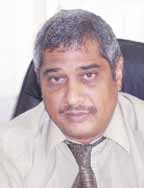– source
The report on the special investigation into the Customs/Fidelity fraud has charged that the Guyana Revenue Authority (GRA) used “deliberate tactics to frustrate the investigation,” citing the reluctance of officers to provide information as one of the difficulties encountered by the task force during its investigation.
And according to a source close to the GRA the claims made in the report raise “interesting questions” about the completeness of the probe.
The report, which emerged from the investigation into “alleged collusion between Customs Officers with Fidelity Investments/Kong Inc to defraud the Guyana Revenue Authority of millions of dollars in tax revenue” also contends that “requests to the GRA for the submission of documents were not treated with any urgency.”

According to the report, two registers, “a production register” and “lodgement registers for the period July to December 2007” were not produced.
According to the report, when an oral request was made to the GRA for the submission to the task force of the production register for a named customs officer, the document was passed instead to the Director of Customs and Trade Administration. The report states that the task force then contacted Commissioner General Khurshid Sattaur who advised that requests to the GRA by the task force for information should be put in writing, The report adds that having complied with that directive the task force was then told in writing by the Commissioner General that the information which it was seeking “could not be found”.
The source told Stabroek Business that “this particular revelation by the task force was quite amazing “since it seems as though they are implying that information relating to the inquiry was suppressed by the GRA. One would have thought that the modalities for the movement of information between the GRA and the task force would have been settled prior to the start of the enquiry. It does not appear that those modalities were in place at the time of the alleged exchanges between the Commissioner General and the task force.”
Asked whether it was likely that the non-receipt of some of the information requested by the task force may have affected the thoroughness of the report the source said that given the nature of the enquiry “one would have to assume that every bit of information requested by the task force would have had a direct or indirect relevance to some aspect of the enquiry.
Unless the task force says that the absence of that piece of information did not in any way hamper its investigation into the particular issue associated with the documents, one really cannot be blamed for assuming otherwise,” the source said.
The source, who said that he had read that section of the report pertaining to “difficulties en-countered by the task force during this investigation” said that “it defies belief” that issues of refusing to cooperate with the task force could have arisen at the level of the GRA “after all the various official assurances that we had received about a fair and transparent enquiry.
What is even more interesting about all this is that the report itself is quite deliberate in citing what it says were the GRA’s attempts to frustrate the enquiry.
Asked whether he thought that the task force’s claims against the GRA ought to be investigated the source responded that an investigation of the nature “would, more likely than not depend on whether it is felt that the GRA’s alleged actions may have compromised the outcome of the investigation in a particularly significant manner.”





